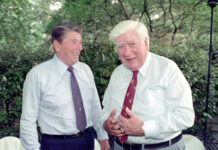[sgmb id=”2″]
The Trump Administration has announced that it will seek to reverse the U.S. Department of Labor’s historic announcement that millions of investors will finally be able to receive objective, unbiased information about their investment choices. This attack on the fiduciary standard also is being abetted by the most powerful, reactionary lobbying forces in Washington, according to financial commentator Chuck Epstein.
“The new U.S. Department of Labor regulations mandating fee disclosures for 401(k)s and mutual fund shareholders marks the first time millions of investors will be able to see the actual costs of their 401(k) plans. But, for many investors, this new information will be shocking,” Epstein said.
If fully implemented. the new regulations, championed by the U.S. Department of Labor and Assistant Secretary Phyllis Borzi, would also change the way financial advisors work with their clients and could mean a whole new business model for the investment industry. This also is a major reason why the financial services industry has spent millions of dollars lobbying against the fiduciary standard for almost a decade, he added.
While the Council of Economic Advisers calculated that a worker who rolls over 401(k) savings to an IRA at age 45 and received inaccurate advice from an advisor could have 17% less savings by the time they reach age 65, there are 17 other separate fees that can be charged to unsuspecting investors. The Council estimated that investment advice tainted by conflicts-of-interest costs investors about $17 billion a year.
“These are huge numbers,” Epstein said, “but they don’t include the $9.5 billion in revenue sharing and 12b-1 fees that are paid annually to financial firms and representatives, as well as the lack of transparency in the huge annuity and life insurance industry. The DOL’s new fiduciary regulations are intended to force disclosure of all these revenue streams and that is why they have the potential to overturn the industry’s very profitable business model that’s based on conflicts-of-interest between investors and investment professionals.
“This is why the financial industry has spent millions on lobbying against the rule for so many years. And even though the regulations will take effect in stages beginning in April 2017, the industry and Congressional Republicans will continue to work day and night against the DOL regulation. Based on their lobbying efforts that have focused on the fiduciary standard over the past decade, I doubt if there is any industry in the U.S. which has such distain for its own customers as the financial services industry,” he said.
As presented in Epstein’s book, How 401(k) Fees Destroy Wealth and What Investors Can do To Protect Themselves, 401(k) participants pay about $164 million in fees daily to the financial services industry. Even worse, most participants do not even know what services they are paying for or the conflicts-of-interest taint many 401(k) plans.
Individual Investors Should Take Action to Protect Their Portfolios
Until the new regulations are formally implemented, Epstein recommended that investors do the following to protect their portfolios:
- The investment industry paysLearn to identify conflicts-of-interest in financial relationships, including those affecting your 401(k) at work ;
- Remember that managing fees and expenses is the most important factor under an investor’s direct control. They must be managed for long-term financial success;
- Follow the “one-strike and you’re out rule” when it comes to dealing with your financial advisor. “Financial mistakes are too expensive for all investors and for retirees they represent money that can never be recovered,” he said.
- Ask your financial advisor if they adhere to the fiduciary standard, then ask them what it means to them, and finally, have them put that claim in writing.
- Get politically active and ask your elected representatives in Congress to continue to advance the DOL’s fiduciary standard regulation;
- Ask your advisor if their firm or the funds in your portfolio are managed by firms, such as AG Edwards, Edward Jones, BofA, Merrill, CitiBank, Oppenheimer, Principal, Hancock, Fidelity, T. Rowe, etc., contribute to lobby against the fiduciary standard. If they do, look for another firm or register your complaint that your own money is being used to generate fees and revenues that are then diverted to lobbyists working against your best interests.
- Don’t invest in fund companies that employ mutual fund wholesalers. Wholesalers are used in a national sales force and are among the most highly-paid jobs in the mutual fund industry, with an average salary of $165,000, according to Simply Hired. Wholesaler expenses are used to increase assets under management, but do nothing to boost the return on your mutual funds. On the contrary, they often decrease returns.
- Ask your advisor when your mutual fund last reduced its fees. Funds that grow in asset size reach a more efficient scale of economy and are cheaper to manage, especially with the decreasing costs of technology. If your fund is growing in assets and has not made a corresponding decrease in their total expense ratio, ask why those savings are not being passed along to shareholders.
These may be tough questions, but the reality is no one will be more concerned about your money than you. Take the needed steps to protect it. If not, you have no one to blame but yourself.
The book, How 401(k) Fees Destroy Wealth and What Investors Can do To Protect Themselves, is based on the first-hand experiences of Palm Beach Gardens, Florida-based author and financial professional Chuck Epstein, who spent over 25 years in the financial services industry and has held senior-level positions at major investment firms. He blogs about financial industry developments at his site, www.mutualfundreform.com.
The book is available on Amazon for $15.95 and Kindle for $9.95. It is 259 pages, with six charts, a glossary and over 250 footnotes. ISBN 978-1477657997











